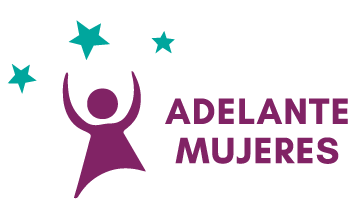How LGBTQIA+ Youth Leadership Has Transformed The Chicas Program
In the Chicas Youth Development Program, there is one underlying theme: You have the right to be here.
When students learn that they deserve to take up space, that their voices matter, and that they are capable of creating the change they want to see, activism is never far behind. As Pride month comes to a close, we highlight ways Latina youth are leading in the LGBTQIA+ movement.
Itzel Chavez Gomez, Chicas College and Career Coordinator at Adelante Mujeres, and Tania Villanueva, Chicas Youth Advocate and Project Developer, talk about their experiences learning from students and how our Chicas Program has become an inclusive space for female-identifying Latinx youth.
“Oftentimes, students don’t have safe spaces where they can have these conversations and, even if we’re not all experts, there’s value in having these conversations and learning together.”
Gen Z, in comparison to its older generation counterparts, are identifying as part of the LGBTQIA+ community in larger numbers. How has the Chicas Program adjusted to accommodate the growing need of not only Latina youth programming but Latinx youth LGBTQ+ spaces?
Itzel: The Chicas Program works to address the needs of the community it serves and ensure all our participants feel welcomed, validated, and safe. From introducing LGBTQ+ leaders in our sessions, making space for LGBTQ+ conversations, to asking students to share their pronouns, we constantly strive to ensure our spaces are inclusive for all the students we serve.
Can you give some examples of adjustments to language, practices, or sessions you have had to make to provide an inclusive space for LGBTQIA+ youth? And what type of impact has it had on students?
Itzel: When recruiting for sessions and talking about the program, we always say “female-identifying Latinx youth” because that’s what Chicas is all about – empowering feminized Latinas. As we all know, historically there has been an attack against feminized folks -- anyone who identifies as female, who has female characteristics/traits, and any other “typically” feminine attributes, has experienced some form of discrimination and that has to do with the misogyny that is embedded in the cultures we are a part of and the society we live in.
In sessions, we talk about these oppressions — about our experiences of living in the world as female-identifying Latinxs. Oftentimes, Chicas is one of the few places students feel comfortable talking about sexuality and gender because there’s a taboo on this subject culturally and societally, although it’s getting better. Students feel comfortable sharing about their own identities, how they're exploring who they are, and they even share about how their friends and peers identify within the LGBTQ+ community. It’s beautiful to witness.
As visibility increases for LGBTQ+ people and issues, youth are adopting these identities at earlier ages. This can inherently make them leaders and changemakers in the LGBTQ+ movement, not only for those who identity as LGBTQ+ but allies as well. What are ways you have noticed students are leading in this movement?
Tania: The biggest way I have seen students creating change is by simply educating others. Education is key and education is continuous. Knowing that some of these youths are adopting these identities earlier in life allows room for others to ask questions and learn. As a facilitator, creating these safe spaces allows us to start to create a dialogue about people's identities, how this has impacted their lives, and how people can show their support and solitude by becoming strong allies.
As facilitators, you are in a position to teach and facilitate spaces for students to talk about many topics safely, however, have there been times where students have taught you about this topic?
Tania: To ask rather than assume. Assumptions can lead to misrepresentation, misidentifying, and misunderstandings. Especially with a topic as fragile and important as this, it is crucial we are clear about what people understand.
Itzel: Their courage to be unapologetically themselves is inspiring. When I hear youth saying, "this is who I am," when I listen to their conversations — it makes me want to learn more.
In your opinion, how can we learn from youth when it comes to this topic?
Tania: We can learn to be open, receptive, to listen, and be proactive. It's simple: what youth want from these spaces is to be heard and understood.
Itzel: We’ve heard this time and again but Youth Are The Future. We see youth at the forefront of social movements because they are tired of living in a world that places limitations on who they are and who they can be.
As the Chicas Program continues to evolve, adjust, and grow, one thing students can continue to experience is a space where they feel welcomed, seen, and valued.
Itzel really says it best: “We all have a responsibility to make the world a better place for youth. Youth shouldn't be expected to eliminate barriers, to address national/global issues -- they should be allowed to live in a world where they are able to explore who they are, adopt their own identities, find their passions, and be happy. We as adults should be the ones who pave the way for them and that starts with taking responsibility for our mistakes and our biases, and educating ourselves.”



